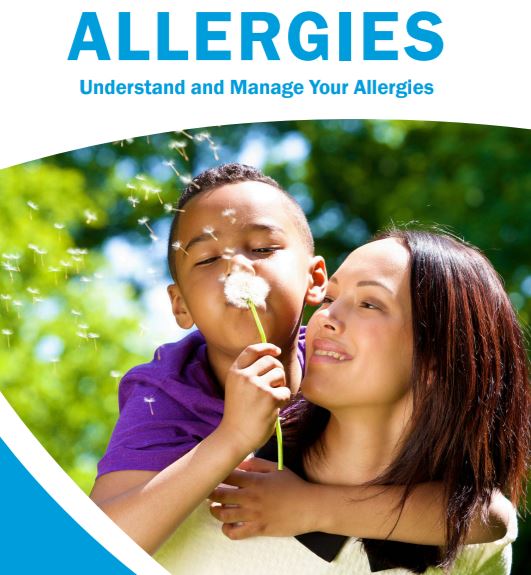In this section: Allergies And Asthma | Managing Allergies | Immunotherapy Decision Making Tool | Allergy Treatments
Types of Allergy Treatment
Managing symptoms of asthma and seasonal allergies can be a real task for people who suffer from both. While there is no cure for asthma or allergies there are treatment options available for individuals suffering with seasonal allergies, in most cases these treatment options can help to control symptoms. The choice of treatment option will vary and will depend on how severe your allergy reactions are and how they affect the quality of your life. Please discuss these options with your healthcare provider.
Treatment options for seasonal allergies:
Antihistamines
These aim to provide quick relief of symptoms by lessening the effects of histamine which is one of the chemicals released by the body during an allergic reaction.
- They can reduce sneezing, runny noses, watery eyes, and itchy throats for a while.
- They work best when used before the exposure to an allergen, lasting up to 24 hours.
- Antihistamines can be purchased over the counter
- Antihistamines can be sedating or non-sedating.
- Some antihistamines are used as eye drops and nasal sprays.
- Newer antihistamines may reduce drowsiness while some may interact with certain medicines and foods.
- A doctor or pharmacist can advise regarding proper usage.
Decongestant sprays
These can help relieve a stuffy nose caused by allergies.
- They are generally recommended for use no longer than a few days at a time.
- They can be taken as pills, nose sprays and nose drops.
- It is important to know that some products contain antihistamines poles decongestants for symptoms of relief. Seeking advice from a healthcare professional is recommended.
Inhaled steroids (nasal spray)
Nasal steroids decrease the damage done by inflammatory cells brought to the nasal lining by the allergic reaction or the infection.
- The nasal symptoms improve on a daily basis and are easier to treat or control.
- Nasal steroids can be tried if antihistamines are not working and can be used if the allergy symptoms are chronic or if symptoms are moderate to severe.
- The above medications are preventer medications which aim to prevent symptoms from developing by suppressing the allergic reaction. With seasonal allergies, you need to begin treatment several weeks before the “high season” for your particular allergy trigger.
Allergen Immunotherapy
If allergen avoidance and medical treatment for allergic rhinitis aren’t effective, allergy shots – also called (allergen immunotherapy) may be an option.
- Allergy shots contain small amounts of allergens.
- They are given on a regular schedule, while slowly increasing the dosage, so that your body gets used to the allergens and no longer reacts to them.
- Allergy shots are only used when the allergens you are sensitive to are known and when you can’t avoid coming into contact with them.
- It takes a few months to years to finish treatment, and you may need to have treatments throughout your life.
- If you require long term treatment, you need to discuss these options with your doctor.
- At your next check-up, talk to your doctor, nurse or pharmacist about how seasonal allergies affect your asthma and which treatment(s) may be suitable for you.
What if you have a severe allergic reaction?
Some types of allergies produce multiple symptoms, and in rare cases, an allergic reaction can become very severe, this severe reaction is called anaphylaxis.
Signs of anaphylaxis include:
- Difficulty breathing
- Difficulty swallowing
- Swelling of the lips, tongue, and throat or other parts of the body
- Dizziness or loss of consciousness
How is an anaphylaxis triggered?
Anaphylaxis usually occurs minutes after exposure to a triggering substance, mainly associated with food allergies, such as a peanuts or shellfish, but some reactions might be delayed by as long as 4 hours.
How to treat an anaphylactic reaction:
Anaphylactic reactions can be treated successfully if proper medical procedures are followed. If you get severe life threatening anaphylactic allergic reactions, you should carry an adrenalin pen (Epi-pen). Learn more about emergency treatment from Food Allergy Canada.
Managing Allergies
Learn about allergy avoidance strategies and other ways to help manage your allergies and stay healthy.
Asthma & Allergy HelpLine
Do you have questions about asthma? Contact our free helpline service to be connected with a Certified Respiratory Educator who can provide you with personalized support.
Allergies & Asthma
Learn about the relationship between asthma and allergies. Find out common allergens and allergy symptoms.

